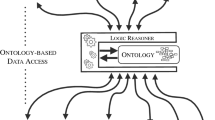Summary
A global domain Ontology is often proposed as a means to semantically interlink local heterogeneous database resources within a domain. The main advantage is that users need only understand one interface pertaining to the global ontology rather than to understand each of the local database resource interfaces. However, a global domain Ontology may contain considerable complexity, in order to cover increasing numbers of heterogeneous local data resources. Further, some users may not be familiar with the full global model in order to pose and refine their queries under the strict constraints of a single conceptualisation. The development and application of a flexible approach to derive more targeted views, oriented to different types of users and applications, is reported here. The key design challenge tackled here was to derive and constrain user views of the global view, in such a way that the quality of the global view model is maintained in each user view, and that each user view can be accurately mapped to the global view.
Access this chapter
Tax calculation will be finalised at checkout
Purchases are for personal use only
Preview
Unable to display preview. Download preview PDF.
Similar content being viewed by others
References
Pellet, an open-source Java based OWL DL reasoner, Home page, retrieved from http://www.mindswap.org/2003/pellet/index.shtml on 2006-01.
Adnani, M.E., Ygtongnon, K. and Benslimane, D., A multiple layered functional data model to support multiple representations and interoperability of GIS: Application to urban management systems. In Proceedings of the 9th ACM international symposium on Advances in geographic information systems (Atlanta, Georgia, USA), 2001, 70–75.
Baader, F. and Nutt, W., Basic Description Logics. Cambridge University Press, Cambridge, 2003.
Baldwin, D., Applying multiple views to information systems: A Preliminary framework. ACM SIGMIS Database, 24 (4), 15–30.
Bechhofer, S., The DIG description logic interface: DIG/1.0, University of Manchester, Manchester, UK, http://dl-web.man.ac.uk/dig/2002/10/interface.pdf on 2006-01.
Bechhofer, S., Harmelen, F.v., Hendler, J., Horrocks, I., McGuinness, D.L., Patel-Schneider, P.F., Stein, L.A. and Olin, F.W., OWL Web ontology language reference, W3C recommendation, 10 February 2004, http://www.w3.org/TR/owl-ref/#Sublanguages on 2006-01.
Benchikha, F. and Boufaida, M., Roles, views and viewpoints in object-oriented databases. Workshop at European Conference on Object-Oriented Programming (ECOOP 2005), Glasgow, UK, 2005.
Bertino, E., Catania, B. and Zarri, G.P., Intelligent Database Systems. Addison-Wesley, Boston, MA, 2001, 170–178.
Bouquet, P., Ehrig, M., Euzenat, J., Franconi, E., Hitzler, P., Krötzsch, M., Serafini, L., Stamou, G., Sure, Y. and Tessaris, S., Knowledge Web project deliverable version 2.2.1, specification of a common framework for characterizing alignment, Home page, retrieved from http://knowledgeweb.semanticweb.org on 2005-02.
Calvanese, D., Giacomo, G.D. and Lenzerini, M., A Framework for ontology integration. In Proceedings of the 2001 Int. Semantic Web Working Symposium, 2001, 303–316.
Damasio, C.V., Analyti, A., Antoniou, G. and Wagner, G., Supporting open and closed world reasoning on the Web. In Proceedings of Principles and Practice of Semantic Web Reasoning (PPSWR06) LNCS, Springer, Berlin Heidelberg New York, 2005, 21–36.
Das, S., Deductive Databases and Logic Programming. Addison-Wesley, Wokingham, 1992.
De Bruijn, J., Eiter, T., Polleres, A. and Tompits H., On representational issues about combinations of classical theories with nonmonotonic rules. DERI Technical Report, retrieved from http://www.deri.at/digital-library/browse/technical-reports/ on 2006-03.
Haastrup, P. and Wurtz, J. (eds.) Environmental Data Exchange Network for Inland Water. ISBN 978-0-444-52973-2. Elsevier, New York, 2007.
Jung, E.-C., Sato, K., Chen, Y., He, X., MacTavish, T. and Cracchiolo, D., DIF knowledge management system: bridging viewpoints for interactive system design. In Proceeding 11th Human Computer Interaction International Conference (Las Vegas, Nevada USA), 2005.
Michael Stonebraker, Paul Brown and Martine Herbach, Interoperability, distributed applications and distributed databases: The virtual table interface. IEEE Data Eng. Bull., 21 (3), 25–33.
Ng., G., Open vs. closed world, rules vs. queries: use cases from industry. In OWL experiences and directions workshop (Galway, Ireland), 2005.
Pan, Z. and Heflin, J., DLDB: Extending relational databases to support semantic Web queries. Technical Report LU-CSE-04-006, Dept. of Computer Science and Engineering, Lehigh University, http://www.cse.lehigh.edu/~heflin/pubs/psss03-poster.pdf on 2006-01.
Patel-Schneider, P.F. and Horrocks I., A Comparison of two modelling paradigms in the semantic Web. In Proceedings of the Fifteenth International World Wide Web Conference (WWW 2006), ACM, 2006, 3–12.
Ribière, M. and Dieng-Kuntz, R., A viewpoint model for cooperative building of an ontology. In Proceeding of 10th International Conference on Conceptual Structures (ICCS 2002), (Borovets, Bulgaria), Springer, Berlin Heidelberg New York, 2002, 220–234.
Sheth, A. and Larson, J., Federated database systems for managing distributed, heterogeneous, and autonomous databases. ACM Computing Surveys, 22 (3), 183–230.
Spaccapietra, S., Parent, C. and Vangenot, C., GIS databases: From multiscale to MultiRepresentation. In Proceedings 4th InternationalSymposium, SARA-2000 (Horseshoe Bay, Texas, USA), 2000, 57–70.
Stjernholm, M., Preux, D., Sortkjaer, O. and Zuo, L., DILIVERABLE 17, Structured list integration into IW distributed semantic hybrid agents application, The Environmental Data Exchange Network for Inland Water (EDEN-IW) project, retrieved from http://www.eden-iw.org on 2006-05.
Author information
Authors and Affiliations
Editor information
Editors and Affiliations
Rights and permissions
Copyright information
© 2008 Springer-Verlag Berlin Heidelberg
About this chapter
Cite this chapter
Poslad, S., Zuo, L. (2008). An Adaptive Semantic Framework to Support Multiple User Viewpoints over Multiple Databases. In: Wallace, M., Angelides, M.C., Mylonas, P. (eds) Advances in Semantic Media Adaptation and Personalization. Studies in Computational Intelligence, vol 93. Springer, Berlin, Heidelberg. https://doi.org/10.1007/978-3-540-76361_13
Download citation
DOI: https://doi.org/10.1007/978-3-540-76361_13
Publisher Name: Springer, Berlin, Heidelberg
Print ISBN: 978-3-540-76359-8
Online ISBN: 978-3-540-76361-1
eBook Packages: EngineeringEngineering (R0)




